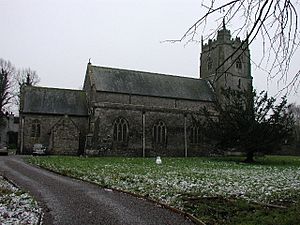St Peter's Church, Wentlooge facts for kids
Quick facts for kids St Peter's Church, Wentlooge |
|
|---|---|
| Parish Church of St Peter | |
 |
|
| Location | Peterstone |
| Country | Wales |
| History | |
| Status | Deconsecrated |
| Dedication | St Peter |
| Architecture | |
| Functional status | Private house |
| Heritage designation | Grade I |
| Designated | 3 January 1963 |
| Specifications | |
| Number of spires | 1 |
St Peter's Church is an old church building in the village of Peterstone. This village is located southwest of Newport in south Wales. It was built in the 1400s and has a special design called Perpendicular style. The church was repaired twice. The first time was after a big flood in 1607. The second major repair happened in the late 1800s. A famous historian, John Newman, called it "the noblest and most beautiful Perpendicular church in the whole county." The building was given a special protection status, Grade I, on January 3, 1963.
Contents
History of St Peter's Church
Building the Church
The church was built in the middle of the 1400s. It was built under the guidance of St Augustine's Abbey. John Newman believes the church's "ambitious" and "West Country character" comes from this connection.
What the Church Looks Like
The church is made of grey limestone. It also has special oolitic limestone decorations. It is a large building. It includes a main area called a nave with side sections called aisles. There is also a chancel, which is the part of the church near the altar.
The church has a tall tower at the west end. This tower has three levels. It also has carved figures of saints on its four sides. The main part of the church, the nave, has a special roof from the 1400s. This roof is called a hammerbeam roof. It has been repaired over time. The chancel and its roof were rebuilt in the 1800s.
Later Repairs and Features
The repairs in the 1800s were paid for by Sir George Walker. He did this to honor his wife, Fanny. She was the daughter of Lord Tredegar. John Newman described the inside of the church as "beautifully calm and spacious." This means it feels very peaceful and open inside.
Images for kids


